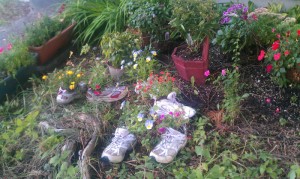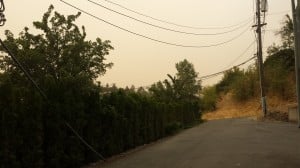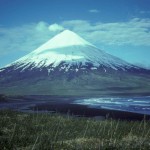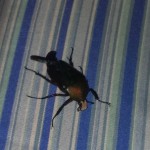I mentioned last week how disconnected I was from the cycles of nature as a child. It wasn’t for lack of exposure to non-urban places. In fact, my father took great pride in the fact that he shared his love of the outdoors with me from infancy. My parents have photo albums full of pictures of me in a backpack on my dad’s back exploring nature. My dad would carry magnifying glasses in his pocket so that we could look at leaves and bugs and rocks up close. When I was 3 we visited a tiny pod with tadpoles in it every day until they had all turned to frogs and hoped away. We went tent-camping many times in my childhood, mostly in the forest but sometimes in the desert and at least once on a beach.
Yet, even with all that exposure to nature, I had no sense of the cycles of the natural world around me. The thought of it baffles me a bit. We had plants in the house. I must have noticed that they changed over the course of the year, but I have no sense of it. I certainly noticed that the weather changed throughout the year and that it was foggy and rainy in winter and foggy-then-sunny in the summer. (If you visit San Francisco in the summer, bring sweatshirts for the morning and short sleeve shirts for the afternoon.)
I had no sense of what fruit was in season at what time of year. I had no sense of when animals shed or when they got bushier coats of hair. Aside from the permanent residence of pigeons and seagulls, I had no idea about what birds could be found in San Francisco in any month.
The last few days I’ve been reading a book called Tending the Wild: Native American Knowledge and the Management of California’s Natural Resources by M. Kat Anderson. There’s a really insightful quote in the preface that helped me understand something about why I lacked that full sense of the natural cycle. She says,
By using a plant or an animal, interacting with it where it lives, and tying your well-being to is existence, you can intimate with it and understand it. The elders challenged the notion I had grown up with — that one should respect nature by leaving it alone — by showing me that we learn respect through the demands put on us by the great responsibility of using a plant or an animal.
That really comes down to the heart of the matter. Growing up, I never interacted with a plant or animal where it lived over the course of a year or more. I never had to tie my own well-being to that other being’s existence. I was always taught to leave nature alone. Don’t pick plants. Don’t interact with animals that aren’t your pets.
I learned about natural cycles for real when I started eating wild food, sitting to watch birds and squirrels, and learning to garden. I’ve never hunted animals to kill them, but learning to ‘hunt’ them to watch them in their homes has been instructive. The more I interact with nature and see myself as a part of nature rather than outside of it, the more I notice and understand the cycles around me.















